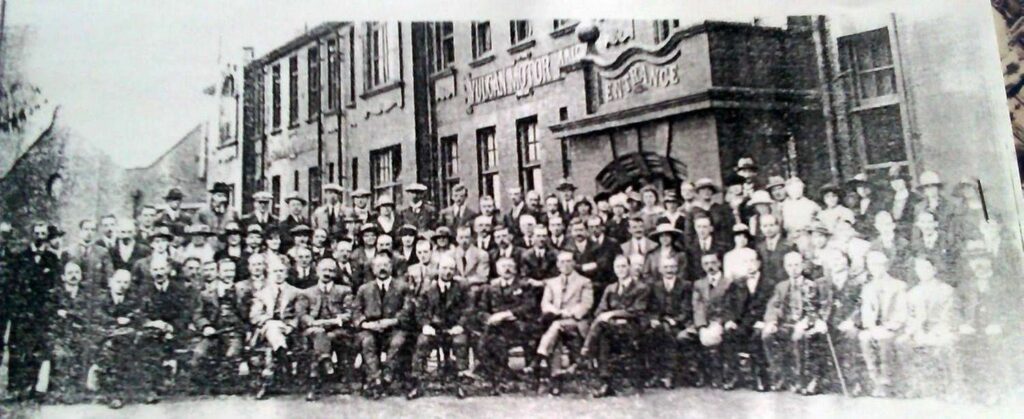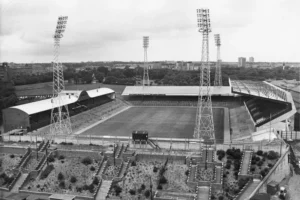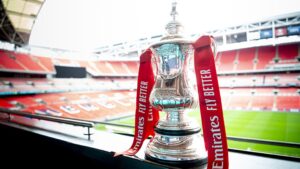Supporters of Southport FC have endured more than their share of reinventions, false dawns and grand plans. But the collapse of the Big Help Group has forced a familiar question: how did we end up here again – staring at the wreckage of another failed “project”, wondering how so much trust was placed in so little substance?
The truth is, this is not the first time Southport has been caught up in something like this. In fact, you could go back more than a century and find striking similarities in one of the most curious – and nearly catastrophic – chapters in the club’s history: the short-lived experiment known as Southport Vulcan.
The Vulcan Chapter (1918–1919)
In 1918, with football still recovering after the First World War, Southport FC was effectively taken over by Councillor Thomas Hampson – then Mayor of the town and chairman of the Vulcan Motor & Engineering Company. Vulcan was a major local employer in Crossens, manufacturing cars and commercial vehicles. The club was rebranded as Southport Vulcan, a move intended to promote Hampson’s business interests – one of the earliest and boldest examples of commercial naming in English football.
At first, the shift brought optimism. Backed by factory money, the club recruited well and finished the season strongly, and even applied for a place in the newly enlarged Second Division of the Football League.
But the warning signs soon appeared.
The League rejected Southport’s application, awarding them just seven votes. Coventry City, West Ham United, Rotherham County and South Shields were all elected instead. Realistically, Southport never stood a chance – the Football League had little interest in admitting “works” teams with overt commercial affiliations. The club’s name was a clear obstacle.
By the summer of 1919, the Vulcan Company abruptly withdrew its support. A public meeting was held on 5 June to discuss the future of the club. On 29 July, it was confirmed that Vulcan had fully relinquished control.
Fortunately, the damage was limited. The company had assumed all liabilities and the remainder of the ground lease, leaving the reformed club effectively debt-free. The Southport Education Committee stepped in to take over the lease of the Ash Lane ground and purchased the stands, agreeing to allow the club to play on alternate Saturdays. Secretary Edwin Clayton had thankfully safeguarded the club’s interests by securing a place in the Central League and ensuring entry into the FA Cup.
A new committee was formed and it was unanimously agreed that the name should change to Southport Football Club.
“It is not intended to revive the name of the Southport Vulcan Football Club,” reported the Southport Visiter. “The new club will be known as the Southport Football Club.”
Then came the scandal. Shortly after the collapse, Councillor Hampson – the architect of the Vulcan project – was sentenced to 12 months in prison for fraud. He had misappropriated £22,266 5s 1d from the Vulcan Company to fund his personal interests.
It had all the hallmarks of a civic-backed revolution: bold, well-meaning, but ultimately reliant on the wealth, ambition, and unchecked power of one man.
Sound familiar?
The Big Help Era (2023–2024)
Fast-forward a hundred years and the faces have changed, but the pattern feels eerily similar.
The Big Help Group arrived with grand promises and polished PR: a community-focused, purpose-driven rescue mission for Southport FC. There was talk of sustainability, inclusion, ambition. But few delved into the business behind it. Fewer still asked where the actual money was coming from. Instead of a club name change this time, there was a stadium name change – but the familiar hallmarks were there.
What followed is now well documented. Unpaid bills to local suppliers. Football creditors left in the lurch. A club nearly brought to its knees. And when the curtain was pulled back, the account was left with barely enough in it to buy a set of footballs.
An investigation by The Post confirmed:
“On December 7th, just weeks after his takeover of Southport was confirmed, the Charity Commission launched an inquiry into Big Help Project, Mitchell’s largest organisation. The regulator had noticed a ‘significant increase in its reported income’. After taking a look at the charity, investigators had ‘concerns around trustee decision making, potential unauthorised trustee benefit and unmanaged conflicts of interest.
Earlier this month, Mitchell himself was also declared personally bankrupt, as well as his partner, serving Liverpool councillor Colette Goulding”
No one has been accused of criminal wrongdoing. But as with the Vulcan collapse, the structural fragility of the model – one man’s vision, unchecked and unchallenged – was exposed too late. And once again, it was the supporters left to pick up the pieces.
Different Names, Same Playbook
There is a clear pattern here. A charismatic figure with civic clout or good PR arrives offering a solution. They tell supporters exactly what they want to hear. The local press laps it up. Anyone asking awkward questions is painted as negative or divisive. And before long, the damage is done.
Whether it was Hampson’s fraud or Big Help’s financial disintegration, the common thread is simple: ambition without transparency, and change without scrutiny, rarely ends well.
Which leads to a bigger question: why do we keep falling for this?
The Lesson Might Not Be About Them – It Might Be About Us
In both eras – Vulcan and Big Help – the club was effectively handed over to people without meaningful oversight. There was no real scrutiny, no independent structure to speak for the wider fanbase, and no mechanism for asking the right questions early enough.
The same was true more recently, when Phil Hodgkinson walked away, leaving Ian Kyle in control. There was no active supporters’ body to ask what safeguards were in place, or to challenge the handover. Nor was there a body present when Kyle later sold his shares to the Big Help Group – a decision that would prove to have far-reaching consequences.
At the time, many supporters were simply relieved that the whole pack of cards had not come tumbling down. The immediate danger seemed to have passed, and with it went the urgency to organise, to scrutinise, or to futureproof the club’s structure. But that relief came at a cost – and the structures that might have protected the club during the Big Help era were never rebuilt.
That is why now, as we ride a wave of optimism under new owners, we cannot afford to make the same mistake again. There are only so many times you get away with it.
With a new era beginning at Southport, the club has a chance to do things differently – and so do we. And this time, it is not just about learning from the past. It is about preparing for what is coming.
The Football Governance Bill, now progressing through Parliament, will soon introduce a statutory Independent Football Regulator for the top five tiers. Clubs covered by the Bill will need a licence to operate – and part of that licence will require structured fan engagement, with a recognised supporters’ body consulted on key decisions such as ticket pricing, stadium moves, and even changes to the club’s name, colours, or badge.
This is not just guidance. It is a legal obligation. The regulator will be able to enforce compliance, impose licence conditions, and – where clubs fail to meet governance standards – withhold or withdraw a licence altogether.
Culture Secretary Lisa Nandy called the Bill a landmark moment for fan rights:

“Clubs will be required to establish that a majority of fans are supportive of changes… This should be a right of all fans, not just some.”
The author has previously spoken to Nandy about the importance of the Bill, particularly in light of her role in helping to rescue Wigan Athletic from the clutches of Epic Holdings – an ownership group with past links to individuals involved in the Big Help Project.
And while Southport will not be covered yet, the direction of travel is clear. Supporter representation, governance checks, and transparency are no longer optional extras – they are becoming expectations written into the fabric of the game.
What Happens Now?
Southport FC is under new ownership again. There is hope of a fresh start, and early signs of openness are encouraging. But rebuilding a club means more than patching over holes. It means asking why we keep falling for the same stories – and whether we have done enough, as a supporter base, to protect the club in the long term.
And that starts with how we show up now.
The upcoming fans forum on Friday 4th July is not just another event. It’s a test.
A test of whether we’ve learned anything. A test of whether we’ll ask the right questions. A test of whether we’re finally ready to be more than bystanders.
Ask about the financial plan. Ask how decisions are made. Ask what will happen differently next time. And above all, ask how supporters will be involved in shaping the answers.
Because for once, we have a chance – not just to rebuild from collapse, but to rebuild properly.
Southport Vulcan should have been a lesson. Instead, it became a footnote. Perhaps now, in the shadow of the Big Help collapse, we finally have cause to revisit it.
Because at clubs like ours, history is not just something to remember, it is something to learn from.
And maybe this time, finally, we act on it. 4th July is your chance. Don’t let it pass.
Disclaimer: This article draws on historical research, publicly available records, and verified reporting relating to both past and recent events involving Southport FC. While care has been taken to ensure accuracy, some interpretations are the author’s own and reflect their editorial judgement. The views expressed are not necessarily those of Southport Football Club or any other organisation. Southport Central has been accepted for regulation by IMPRESS, the UK’s independent press regulator, and is currently completing the onboarding process. For any concerns or corrections, please see our complaints procedure.
Fans Forum – Friday 4th July, 7PM
Location: The Leasecar Lounge, Haig Avenue
Format: Open Q&A followed by informal conversations
This event is open to all supporters, shareholders, and interested parties.
Confirmed attendees:
David Cunningham, Kieran Malone, Neil Danns, Mark Duffy, Liam Watson, Steve Porter, Darren Court
Free to attend, but tickets are required to help the club manage numbers.
Reserve your place online – first come, first served
Discover more from Southport Central
Subscribe to get the latest posts sent to your email.

 2 - 1 v Oxford City (A) 18/10/2025
2 - 1 v Oxford City (A) 18/10/2025 







We’ve had far to many down over the past Decade please let’s get this right give us a goal to achieve something even it’s to stay in front of Marine or Chester or even are post code neighbours Chorley just so decent season without the threat of RELEGATION GOOD LUCK YELLOWS